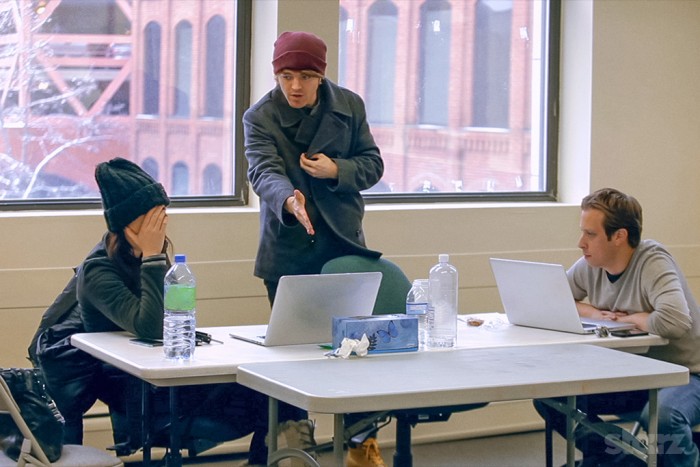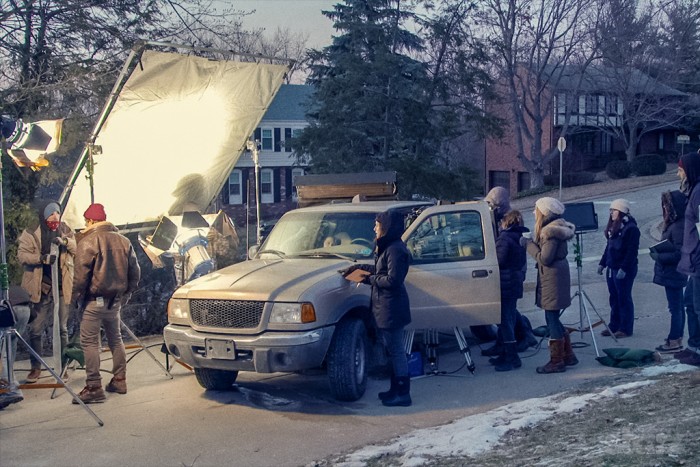Five Mistakes First-Time Filmmakers Make (From The Creators Of 'The Chair')
We may receive a commission on purchases made from links.
I first heard about the Starz original series The Chair a few weeks ago, when a /Filmcast listener suggested it to me. The novel approach of the show was intriguing: Give two directors the same script, provide them a modest budget to direct their first indie film, and allow them each to have final cut. The director who made the better film (according to survey data) would receive $200,000.
The Chair is an essential resource for any beginning filmmaker. Not only is it addictive as hell to see two new filmmakers take their films in dramatically different directions — and the victories and failures that come with that – it also provides a great overview of the hundreds of choices that go into making a film. I dove into the show headfirst and finished the entire series within a week.
I recently had the pleasure of chatting with Chair producers Josh Shader and Chris Moore (the latter of whom also produced films such as American Pie and Good Will Hunting). The full podcast is coming soon, but one of the things we talked about during our interview and over email were what mistakes first-time filmmakers make. Some of these lessons are derived not just from The Chair but from the producers' experiences on other films. Hit the jump to see what they suggest. You can watch The Chair on Starz digital or buy it on Amazon, iTunes, and Google Play.
 1) Not having enough passion for the story you are telling – "Have passion" may sound like weird advice for first-time filmmakers. After all, doesn't filmmaking these days (especially indie filmmaking) inherently require a ton of passion to begin with?
1) Not having enough passion for the story you are telling – "Have passion" may sound like weird advice for first-time filmmakers. After all, doesn't filmmaking these days (especially indie filmmaking) inherently require a ton of passion to begin with?
But according to Shader, sometimes just getting something made at all can be immensely difficult. And it can often come with compromises. "Either you leap at the first opportunity or you contort your creative vision away just to get it made," Shader says. "But if you're not actually making something that you really have passion for that you love and it's a story you want to tell and characters that you're excited about and a subject matter that really resonates with you, there's a disconnect there. Ultimately, as a director, it's your job to sell the project. To sell it to your actors, to sell it to your financiers, to sell it to the distributors, and ultimately to sell your vision to the audience. If it doesn't start with that core passion for the story that you're telling, you're kind of wasting everybody's time."
"'Because someone gave me the money' is a terrible reason to make a movie," Shader added.
2) Treating the people around you poorly – Film is a director's medium, but it's also intensively collaborative. Sometimes, with the pressures of filmmaking bearing down, it can be easy to forget just how much people are sacrificing.
"It's not enough to just acknowledge your collaborators," Shader says. "You should make a point every day to thank and support them — especially on a first-time film where the budget is likely to be low and the pay shitty. Moreover, you can build a dedicated crew that will want to work with you again by making them a valued part of the team."
 3) Closing yourself off to criticism - Viewers of The Chair will know that one of the most riveting parts of the show happens during post-production, when the show's contestants (Shane and Anna) are forced to contend with the production decisions they've made. The way they handle criticism shapes not only the outcome of their respective films but also our perception of them as artists.
3) Closing yourself off to criticism - Viewers of The Chair will know that one of the most riveting parts of the show happens during post-production, when the show's contestants (Shane and Anna) are forced to contend with the production decisions they've made. The way they handle criticism shapes not only the outcome of their respective films but also our perception of them as artists.
What we learn is that being open to criticism is not just a good idea; it's an essential part of being a good director. "I think that the collaborative experience of having to defend your ideas...is in my opinion a part of the process that people should experience," said Moore. "[Film school] is a smaller endeavor. When you go make your first movie, it's just massive. You gotta have people around you and you gotta figure out how you're going to communicate and manage all those people."
Or, as Shader puts it: "Putting yourself in a bubble may make the journey easier, but it will likely result in a worse film."
4) Being unwilling to change your mind - While directors need to be leaders, they shouldn't be afraid to change their mind. Leadership doesn't mean being overly rigid.
Shader describes a typical scenario. "You make assumptions in pre-production. Then you get into production, and that scene you thought was working great in the script – all of a sudden you're shooting it and it's not working. You have to be able to adapt and change to make it work on the day. And then, of course, you make it work on the day and you think it's great, and the you get into post-production and you realize it's not working. And you have to also then be able to change your vision."
Thus, while it's important to "listen to your gut," you should be adaptable to every situation that may arise.
 5) Is film even the right medium for this? - You have an amazing idea for a story. You psych yourself up to make a movie about it. But does it really need to be a film?
5) Is film even the right medium for this? - You have an amazing idea for a story. You psych yourself up to make a movie about it. But does it really need to be a film?
According to Moore, any filmmaker about to undertake the project of filmmaking should ask themselves why film (or video) is crucial to their enterprise. "Why isn't a play? Why isn't a book? Why isn't a short film? Why isn't it a TV show? Why isn't it a podcast? Usually the answer comes somewhere near, 'This story is best told by using a visual medium. The ability to show things to people.' Really sit down and plan out what is it that makes showing it to people so great."
If your story would be equally impactful as a short film or a series of articles in a magazine, reconsider how you are telling your story to maximize impact from the medium.
***
Our full podcast conversation will be coming shortly. In the meantime, subscribe to the /Filmcast on iTunes or RSS to keep up with the latest updates.
